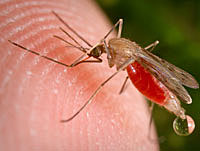2007年VOA标准英语-US Government Tries to Educate Doctors, Patient
时间:2019-01-13 作者:英语课 分类:2007年VOA标准英语(五月)
By Carol Pearson
Washington
23 May 2007
The parasite 1 that causes malaria 2 is wiped out in the United States, but the disease can still cause problems. Doctors so rarely see patients who have it, that they do not always recognize malaria's symptoms. The U.S. Centers for Disease Control and Prevention is now trying to educate American doctors and patients about the symptoms and treatment of malaria. VOA's Carol Pearson has more.
Dr. Phyllis Kozarsky is a malaria specialist at Emory University in Atlanta, Georgia. "We see a case of malaria in our clinic probably about once a month now. So it's becoming more frequent."

Malaria is spread by mosquitoes
Malaria is transmitted in tropical and subtropical areas including sub-Saharan Africa, parts of Asia and parts of South America.
People get it when bitten by an infected mosquito. When American travelers visit countries where the disease is prevalent, or when immigrants or visitors from these countries come to the U.S., they may bring the disease with them.
"We get a lot of requests for assistance with diagnoses and management of malaria," says Kozarsky.
Dr. Monica Parise and her colleagues at the U.S. Centers for Disease Control and Prevention created new guidelines for diagnosis 3 and treatment, available on the Internet at the center's web site, CDC.gov/malaria. The guildlines can also be found in the Journal of the American Medical Association. "We think we've come up with very comprehensive guidelines that can be useful to clinicians if they have patients who travel and come back with malaria."
Malaria can be hard to diagnose, because its main symptoms, fever and fatigue 4, are present in many illnesses. The guidelines include lots of detailed 5 medical information about blood tests for diagnosis, and different drugs for treatment. But there are simpler guidelines as well. "Both doctors and patients can do a lot so malaria isn't missed. When doctors are evaluating a patient who has a fever, they need to ask about a travel history to find out if somebody's gone to a malarious 6 area."
And patients need to tell doctors about their travels. Amy Wald did just that when she returned from a visit to Africa and felt feverish 7 and exhausted 8. She called her regular doctor, but ended up seeing a specialist. "I wouldn't expect an American doctor to know what to do when a patient comes in with malaria."
Dr. James Maguire says that is a major problem. He specializes in parasitic 9 diseases at the University of Maryland Medical School. "I think we have a problem in medical education in some, not all, medical schools where parisitology teaching has been de-emphasized, so many physicians haven't had much background information, and so oftentimes, they are taken by surprise and miss the diagnosis."
The U.S. Centers for Disease Control and Prevention wants doctors and patients to know more about the dangers and treatment of malaria to keep this disease at bay in the U.S.
- The lazy man was a parasite on his family.那懒汉是家里的寄生虫。
- I don't want to be a parasite.I must earn my own way in life.我不想做寄生虫,我要自己养活自己。
- He had frequent attacks of malaria.他常患疟疾。
- Malaria is a kind of serious malady.疟疾是一种严重的疾病。
- His symptoms gave no obvious pointer to a possible diagnosis.他的症状无法作出明确的诊断。
- The engineer made a complete diagnosis of the bridge's collapse.工程师对桥的倒塌做一次彻底的调查分析。
- The old lady can't bear the fatigue of a long journey.这位老妇人不能忍受长途旅行的疲劳。
- I have got over my weakness and fatigue.我已从虚弱和疲劳中恢复过来了。
- He had made a detailed study of the terrain.他对地形作了缜密的研究。
- A detailed list of our publications is available on request.我们的出版物有一份详细的目录备索。
- He is too feverish to rest.他兴奋得安静不下来。
- They worked with feverish haste to finish the job.为了完成此事他们以狂热的速度工作着。
- It was a long haul home and we arrived exhausted.搬运回家的这段路程特别长,到家时我们已筋疲力尽。
- Jenny was exhausted by the hustle of city life.珍妮被城市生活的忙乱弄得筋疲力尽。